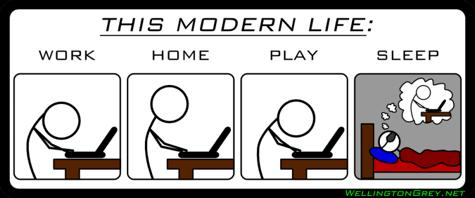Terminó la primera semana de trabajo de los profesores en el colegio, no con pocos pocos problemas de parte de mi Departamento... los sistemas no estuvieron listos a tiempo para la planeación (y aún no lo están) y todavía hay muchas cosas pendientes.
Me cayó de sorpresa, aunque venía fraguándose hace tiempo, darme cuenta de que pocos trabajan como lo hago yo, la mayoría de mis amigos y los directivos del colegio. En el Ministerio era normal trabajar 80 ó 90 horas a la semana (sólo los funcionarios se limitan generalmente a las ocho horas), llegar a la casa a seguir trabajando hasta media noche todos los días y trabajar más los fines de semana. Para mí, este ritmo ha sido normal hace muchos años.
Quienes trabajan conmigo y dependen de mí no tienen esta costumbre. Trabajan sus ocho horas y se van. Rara vez lo hacen en horario extra o los fines de semana. Nunca había pensado mucho en esto, pero ahora que lo "sufro" (y Laura también en el Ministerio con su equipo), empiezo a generar hipótesis sobre los logros en el trabajo, similares a las que formuló en algún momento Larry Summers (ex-economista en jefe del Banco Mundia y expresidente de Harvard) cuando habló de por qué creía que las mujeres no podían triunfar en ciencia. Según Summers, una de las razones es que para ser un científico (ganador de Nobel, etc.) hay que trabajar mucho más de ocho horas diarias y las mujeres suelen tener otras prioridades: la familia, los hijos... Yo no lo ato al género, pero estoy cada vez más convencido de que quienes logran los mejores resultados (y por lo mismo los cargos más altos en empresas públicas y privadas) son quienes no tienen esos límites y trabajan lo necesario para tener el trabajo listo, no lo que el horario indica. No puedo pedirle a mi equipo que trabaje tanto como yo sin pedir horas extra... en parte por eso el trabajo no rinde. Hay mucho y poca gente.
Alguna vez, en la Secretaría de Educación de Cartagena, hicimos, con el Secretario y el equipo de asesores cubanos que trabaja con el Ministerio, una evaluación informal del trabajo de sus funcionarios. Una medidad que utilizó el Secretario fue esa: quienes trabajan más de lo que el horario obliga. Quienes no lo hacían eran calificados como funcionarios poco comprometidos. En el momento me pareció descarado medir así el trabajo de la gente... ahora no sé... es una medida interesante, tal vez no de la calidad del trabajo o la habilidad, pero sí del compromiso.
Me pregunto... ¿debemos trabajar lo que el horario indica o lo que la cantidad de trabajo obliga? Yo, overachiever y workoholic que soy, opino lo segundo y así ha sido toda mi vida: como estudiante universitario, leía todo y más y trasnochaba estudiando la literatura opcional; como profesor trasnochaba preparando materiales para mis clases, calificando, escribiendo guías y exámenes; como consultor, me encerraba en jornadas de 12-18 horas todos los días (con Camilo, quien me empujaba a trabajar más cuando estaba pensando en jugar Tactics Arena -¿todavía existirá?- sacando solicitudes de financiación de proyectos y propuestas para grants; como estudiante de posgrado, estudiaba 80-90 horas semanales y hasta más solo tratando de alcanzar a leer lo que era obligatorio y responder a todas las tareas (insisto en tratando pues nunca logré leer todo lo que asignaban Fernando Reimers y James Honan en sus clases)... Quienes estudiaban conmigo tenían hábitos similares, aunque algunos, especialmente mujeres, eran más juiciosos para empezar a trabajar temprano y así tener tiempo libre en la noche. Overachiever y workoholic... viene desde el colegio, ¿no?

Image taken from Doug Belshaw's blog.


